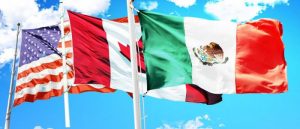In recent months, the international community has been entertained by the drama of the USA’s most recent spectacle. Unfortunately, it has not been a blockbuster movie or sporting event that has created this shock and awe, but their election. Many in the business world have been watching campaign season with particular intrigue as newly introduced laws and regulations will influence both how successful firms are and how they will operate. This is because the macro-environment of a business has a direct impact on how the firm operates and how successful it is. The business world could be particularly impacted in the coming US election where trade agreements have been a hot button topic.
One trade agreement that has been particularly put under the microscope is NAFTA. Politicians have been blaming this free trade agreement for job loss and other economic hardships with Donald Trump going as far as declaring NAFTA “the single worst trade deal ever approved in [the US]” (Politico, 2016) and Democrat Bernie Sanders stating that NAFTA “decimated the state of Michigan” (Detroit News, 2016). However, I agree with the stance asserted in Dustin Walsh’s blog post “Opinion: Candidates wrong on free trade” that the collapse of Michigan’s manufacturing sector was much more complicated and more a result of other changes. Contrary to popular belief, Michigan’s manufacturing sector actually added over 80,000 manufacturing jobs during the first four years of NAFTA. Instead, increasing productivity of firms due to technological gains has a much larger impact and can be associated with over 80% of job losses in developed countries (VOA, 2016).

Removing free trade agreements will not fix economic issues. The removal of free trade agreements directly has an impact on Porter’s Five Forces. Free trade increases rivalry as there are more firms able to compete equally in a specific market. Although removing free trade may help domestic companies develop in the short term by limiting competition, in the long run competition is beneficial to firms as it forces them to differentiate themselves and innovate to gain a competitive edge. Therefore, free trade breeds efficient well-structured firms not dependent on government protection. Furthermore, removing free trade will result in higher prices and more dissent from domestic consumers. It also could result in retaliation from other countries in the form of higher tariffs and eventually trade wars.
In conclusion, candidates are pandering to the discontent of the unemployed and those suffering economic hardship by using free trade agreements as a scapegoat. Instead of blaming these agreements for economic hardships, politicians should hone in on the real causes of economic issues in order to prove their capability to lead the USA.
Sources:
http://www.politico.com/story/2016/09/trump-clinton-come-out-swinging-over-nafta-228712
http://www.detroitnews.com/story/news/politics/2016/03/02/bernie-sanders-trade-policies-decimated-michigan/81247190/
http://www.voanews.com/a/presidential-election-issues-free-trade/3549686.html
Word Count:441